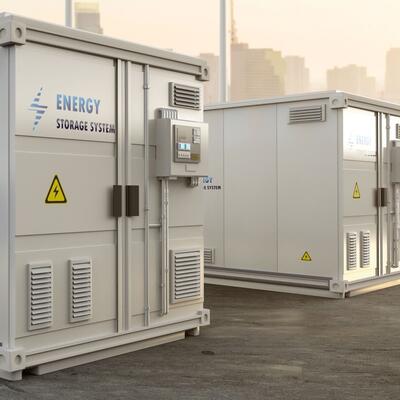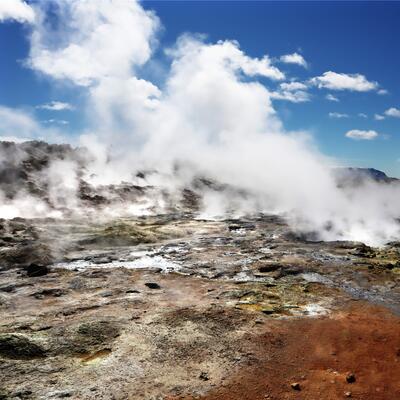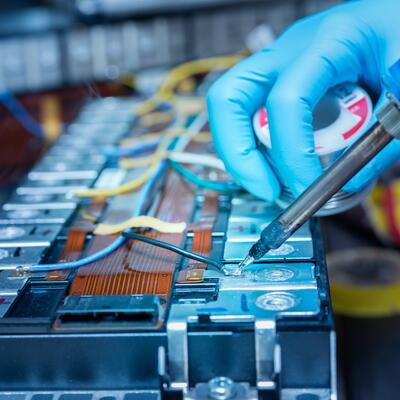
Bitcoin Uses a Ton of Energy — On Purpose. Is it Worth It?
Guests

Rolf Skar

Brittany Kaiser

Thomas Cmar
Summary
Crypto mining for bitcoin uses a TON of energy, as much as whole countries, like Argentina and Sweden. The vast majority of bitcoin mining is still powered by fossil fuel generation – contributing an estimated 65 megatons of carbon emissions to the atmosphere, precisely at a time when we need to be dramatically cutting emissions to address climate disruption. But the validation method upon which new bitcoins are made is actually designed to use more and more energy to be super secure:
“It’s almost like converting electricity, and the waste of electricity, if you will, into security. And there’s so much electricity being used, that no one can use enough to corrupt it,” says Rolf Skar, a senior advisor with Greenpeace.
“Bitcoin mining is now contributing a lot of greenhouse gas emissions where it wasn't just a few years ago. To the point where they’re actually restarting fossil fuel power plants like coal plants that were on their way to retirement here in the US. So, it’s taking us exactly in the wrong direction at exactly the wrong time in the climate crisis,” he says.
Last fall, Ethereum, which is the world's second-largest cryptocurrency, moved from one validation protocol to another which reduced its emissions more than 99%. Skar is part of a campaign created by Greenpeace, the Environmental Working Group and others advocating to change the code behind bitcoin to make it more climate-friendly.
Even when bitcoin mines use renewable power, which many do, environmentalists and others argue that renewable energy could be put to better use:
“It's sucking up energy that could otherwise be used to power people's homes and their workplaces. And what we need to be doing at this stage in order to decarbonize our grid is prioritizing the building of transmission and taking up as much of that energy as possible,” says Thomas Cmar, a senior attorney for the Earthjustice Clean Energy Program.
Bitcoin proponents like Brittany Kaiser of Gryphon Digital Mining say the value of such a secure digital currency is worth it.
“If you start to look at the benefits of this type of technology completely outweighing most of the technologies that we use today for auditability, permission structures, tracking and traceability, crime prevention, you wouldn't say that this is wasted energy at all,” she says. Kaiser agrees with some critics who point out that the crypto mining is opaque and under-regulated in terms of energy use and says the right rules can clean it up, noting that her industry isn’t the only one that uses lots of energy:
“Every single industry, including bitcoin mining, has good actors and has bad actors. And the entire point of having common sense regulation is to block out bad actors and incentivize good actors to make even better decisions.”
Contributing Producer: Lily Jamali
Episode Highlights
4:10 – Rolf Skar on bitcoin’s energy use and security
10:30 – Rolf Skar on getting support to change the code for bitcoin
19:00 – Brittany Kaiser on characterization of bitcoin by environmental community
25:30 – Thomas Cmar on bitcoin mining energy sources
27:30 – Lily Jamali story on bitcoin mine opposition in New York and other places
34:00 – Brittany Kaiser on the value of bitcoin’s digital security
41:00 – Discussion about regulations for bitcoin mining
51:40 – Using bitcoin mining to validate CO2 removal
Resources From This Episode (4)
Full Transcript
Note: Transcripts are generated using a combination of automated software and human transcribers, and may contain errors. Please check the actual audio before quoting it.
Greg Dalton: This is Climate One, I’m Greg Dalton.
Ariana Brocious: And I’m Ariana Brocious.
Greg Dalton: And today, we’re talking about cryptocurrency and climate. As you may or may not be aware, crypto mining, particularly for bitcoin, uses a TON of energy, as much as whole countries, like Argentina and Sweden.
Ariana Brocious: This totally shocked me–I had no idea it was so energy consumptive. But it turns out Bitcoin is designed that way on purpose to be super secure:
Rolf Skar: It’s almost like converting electricity, and the waste of electricity, if you will, into security. And there’s so much electricity being used, that no one can use enough to corrupt it.
Ariana Brocious: That’s Rolf Skar of Greenpeace–we’ll hear more from him in just a minute.
Greg Dalton: The vast majority of bitcoin mining is still powered by fossil fuel generation. All that mining contributes an estimated 65 megatons of carbon emissions to the atmosphere.
Ariana Brocious: Right, this is the decade when we need to be dramatically cutting emissions to address climate disruption. And even when it’s using renewable power, environmentalists and others argue that it’s drawing that power away from our energy transition.
Greg Dalton: Seems like there are so many better things to do with that energy. But Bitcoin proponents like Brittany Kaiser of Gryphon Digital Mining say the value of such a secure digital currency is worth it, and the right rules can clean it up:
Brittany Kaiser: Because every single industry, including bitcoin mining has good actors and has bad actors. And the entire point of having common sense regulation is to block out bad actors and incentivize good actors to make even better decisions. (:14)
Ariana Brocious: I’m gonna be honest Greg, and say that before we did research for this episode, a lot of this crypto discussion was over my head. It’s not the most intuitive system.
Greg Dalton: I used to cover tech and it's confusing to me too. For listeners in the same boat, one of the important distinctions in the crypto world is the different ways you can validate transactions. There are two main ways of doing this–called proof of work and proof of stake. I don’t think you really need to understand the intricacies of each, so long as you know that one of them–proof of WORK, which is what bitcoin uses–requires a TON more energy.
Ariana Brocious: I talked with Rolf Skar, a senior advisor at Greenpeace, who helped me understand the fundamentals of cryptocurrency and bitcoin mining. He’s with a campaign created by Greenpeace, the Environmental Working Group and others advocating to change the code behind bitcoin to make it more climate-friendly.
Rolf Skar: Bitcoin mining is now contributing a lot of greenhouse gas emissions where it wasn't just a few years ago. To the point where they’re actually restarting fossil fuel power plants like coal plants that were on their way to retirement here in the US. So, it’s taking us exactly in the wrong direction at exactly the wrong time in the climate crisis.
Ariana Brocious: And just how much energy does bitcoin consume?
Rolf Skar: It changes all the time but it uses about as much electricity as midsize countries like Sweden at this point.
Ariana Brocious: Wow!
Rolf Skar: So, it's a lot, and it's growing. And that's part of our concern is not what so much it's doing right now, but where this is all going.
Ariana Brocious: So, for someone who is like me, not that well-versed in crypto currency. Can you explain why it's so energy intensive?
Rolf Skar: Yeah, you’ve probably heard the term cryptomining, and most of the crypto currencies out there don't do mining anymore. So, just last year the second biggest one, Ethereum, switched away from mining to be much more energy-efficient. So, right now when you hear cryptomining you really talk about Bitcoin. And there aren’t shovels or picks involved; this is just a term referred to the busywork done by machines. Like very specialized computers that are helping to keep the whole system going. These mining machines are guessing random numbers essentially, it's like rolling a dice that has millions of sides on it as quickly as you can. And then about every 10 minutes one of the miners and they’re competing against each other globally is rewarded by guessing the right number essentially through a newly issued bitcoin. And what they're doing is providing security and a record of the transactions since there’s no centralized bank that's checking on where the money is going. They need this ledger, as they call it, to be maintained. You need to have some way for the community to check. And importantly a way that no one actor like a bad actor who wants to game the system or grab all the bitcoins for themselves can actually do that. So, you have to make it difficult, by using all of this electronic work, the proof of work that goes into you know who gets to validate the next transaction and get a newly minted bitcoin. So, the idea was this will be too hard for any group of people even if they had a lot of money to actually take over. At this point if you're using as much electricity as Sweden that's difficult for any one company even to do. So, it's almost like converting electricity and the waste of electricity if you will, into security. And there is so much electricity being used that no one can use enough to corrupt it. It’s kind of crazy.
Ariana Brocious: So, is there like an endpoint at which it's just gonna be too energy intensive or too hard or too time-consuming to get more bitcoin?
Rolf Skar: Yeah, it’s starting to get there. So, as the price goes up and down that's the other important thing if you’re a mining company and the big large some publicly traded companies now. And you're looking at two things essentially, the price of bitcoin and the price of electricity. And those two things are mainly what determines whether you're making money or not. As the price goes up, it’s more profitable to spend more money on mining machines to pay more for electricity. As it goes down, similarly, it inverses the case. There are a fixed number of bitcoins that are planned to be issued. But the process is supposed to continue for over 100 more years. And I think sometime between now and then the proof of work approach is not gonna be tenable on a finite planet. And we’re seeing miners already getting kicked out of entire countries like China; they're running out of cheap electricity. States are taking action, New York issued a two-year moratorium on new fossil fuel linked cryptomining operations. So, I don't think this is going to continue forever and that's why we’re suggesting a code change makes a lot of sense even if you like bitcoin a lot.
Ariana Brocious: When we talk about the energy usage for bitcoin mining is it the computer processing or server farm cooling or both or what’s actually going into that?
Rolf Skar: Yeah, it’s both I mean it’s a good question. So, these machines are very hungry for electricity. They are guessing as quickly as possible like trillions of guesses a second. And you probably have the experience of like your laptop overheating when you have too many tabs open. These things get very hot very quickly. And then depending on the cooling system the fans everything else that’s like just trying to maintain these machines, but the bulk of it is the machines themselves that are, you know, really supposed to run 24/7 because none of these miners want to drop out of the system. Every guess that they make is another chance to be rewarded. And so, it's around-the-clock operation. Communities that are being affected by bitcoin mining the number one complaint that they have is noise. Some have described it as being next to a plane that's getting ready to take off but it never leaves the airport because it’s just sitting there buzzing 24/7. And it makes living near these things oftentimes untenable for people. So, it’s not just a couple of computers. It's like giant warehouses of buzzing machines.
Ariana Brocious: So, I want to back up one second to something you mentioned earlier, which is that we've seen cryptomining operations restart some decommissioned fossil fuel plants, especially coal plants to make this power that they need. If these are private companies buying private power plants. How is this regulated?
Rolf Skar: Regulation in the US is really local. Like here in California where I live there's some large utilities that control essentially in a monopolistic fashion large swaths of this big states’ electricity. But in rural parts of the country there is rural electrical co-ops, and we've seen bitcoin miners go to the places where the regulatory environment is favorable, and where electricity rates are cheap. And in some cases where they can actually take advantage of essentially subsidies from ratepayers.
Ariana Brocious: So, as you’ve also mentioned, last fall Ethereum, which is the world's second-largest cryptocurrency, moved from one validation protocol to another and that reduced its emissions something like 99.9%. That's staggering. What did it take for that to happen?
Rolf Skar: Well, it has even though it's similar to bitcoin in many ways and was using proof of work. There's a little bit more of a leadership body that sort of steered this process. It’s not as formal as some other companies we’re familiar with, but essentially it had a foundation and some leadership that pushed this process. And they tested it for several years. You had to get the bugs out and kind of run two systems in parallel. And then yeah there was a moment last fall where they just flipped the switch and about 99.99% of its electricity it uses just went away overnight. So, that's the real opportunity for us. We're looking at the opportunity upside as well in a climate crisis when we need all the help we can get. Bitcoin could do the same thing, something similar, maybe even better, and really help out our fight against climate change.
Ariana Brocious: So bitcoin could do this?
Rolf Skar: Yeah, there’s nothing technically getting in the way. This is essentially a social problem. So, the system itself doesn't have formal leadership and it responds to this distributed social ecosystem if you will. So, if enough companies and institutions and stakeholders within the system said, yeah, we think this is a good idea, code can be developed tomorrow and suggested and tested and can move very quickly, but it's mostly something that needs to come from the community itself and the stakeholders involved in it recognizing that there is a need for change.
Ariana Brocious: So, given that there’s sort of this lack of centralized authority with bitcoin are we seeing pressure among these other stakeholders to make that change?
Rolf Skar: Well, there's a lot of stakeholders but we’re hoping that this is a growing movement really. And in particular we’re looking at some of the financial institutions, the banks, the asset managers and those who kind of support the whole system to take action. You know many of the big banks that are actually moving into the space increasingly, not running away, even in the aftermath of some of the dramatic collapses of Silicon Valley Bank or FTX the trading platform. They're moving in big and they often have very specific climate commitments. And they haven’t acknowledged that the climate impacts and the community impacts from bitcoin mining has anything to do with them, but we think it does. Because if it doesn't belong to them and it doesn't belong to anybody then whose emissions are these, you know. So, we think they can play an important role in incentivizing and making the process move forward to test out what might make sense for bitcoin in the future.
Ariana Brocious: What percentage of stakeholders would need to be on board to make this code change and who's against it?
Rolf Skar: Yeah, it's an open question, you know, it’s not an election it’s not like a shareholder, you know, vote or something like that. We don't know yet. We do know that bitcoin has changed significantly in the past. So, there's regular code updates to fix little bugs and things like that. And they all go through a relatively small, very small group of gatekeepers or custodians about six people, some of whose names have been shrouded in mystery and some who are have been identified publicly. These are real humans who are essentially custodians of the whole system and do things like code updates. So, in 2017 there was a really big one; it was contentious. Some people within the community call it the bitcoin Civil War. And it resulted in sort of a new form of bitcoin that we all call bitcoin now and then some other versions of bitcoin like bitcoin cash is an example of a different sort of bitcoin that still survives to this day, but is not as popular as the big one. So, we anticipate something similar maybe happening in the future where there's an efficient form of bitcoin that makes sense during a climate crisis to everyone from everyday investors to big financial situations. We think people will be more and more concerned about climate change and will want to make sure that when they’re participating in the crypto economy that it's aligned with their values and the realities of a world dealing with the climate crisis.
Ariana Brocious: Who would be in favor of keeping the current system and why?
Rolf Skar: Well, there’s a vocal I think it's a minority, a vocal group of mostly folks online who have sort of an orthodox approach to bitcoin where it's perfect just the way it is and even constructive criticism and debate is not welcome. And so, there's a rigidity there, a cognitive rigidity that would have to be overcome. But again, even with a code change they could probably stick with an older version of bitcoin just wouldn't be as popular. The mining companies themselves are probably resistant to change because right now their business model has everything to do with mining. And in the future the whole idea would be to sidestep the need for all that electricity usage and the rest of it. However, that said, I think there are some upside for them too in a transition away from bitcoin mining could be designed to provide financial incentives and essentially a soft landing for them. I mean all of their electricity bills would go away essentially and they wouldn't have to keep buying these expensive machines. So, I think there’s a way for them to participate in the system and benefit from a transition as well.
Ariana Brocious: So, as a casual reader of financial headlines. My impression is that the bitcoin bubble burst and with the collapse of trading platforms like FTX. Is there any reason to believe that cryptocurrencies will just be a fad that will go away on their own and we don't need to worry too much about the carbon footprint?
Rolf Skar: I don't think so. You know the headlines touting bitcoin or cryptocurrencies' demise seem to come out every couple of months and they've done that for years now. I think there is real value in these systems to people. Now, maybe not you and me, but certainly many millions of others and there’s a lot of potential upside. And there’s a lot of people who see that there's money to be made. I mean FTX collapsed, but then after that we saw banks and financial institutions move into the space not move away from it. Buying up distressed assets, setting up their own trading platforms like Fidelity, the big 401[k] and benefits provider retirement packages, things like that debuted its own trading platform and is offering it to their tens of millions of 401[k] customers. So, I trust that the likes of Goldman Sachs and Fidelity as they’re moving into the space have done their homework and they know that this is not going away anytime soon.
Ariana Brocious: So, even if bitcoin moved to some lower energy protocol. Every transaction uses some energy, right? And I'm curious how much and how the energy use of a single Ethereum transaction, for example, compares to like a Visa or MasterCard transaction.
Rolf Skar: Yeah, that's a good question. So, it depends. there's a bunch of different popular cryptocurrencies. Some of them arguably are using less energy than a Visa transaction, for example, because they were designed to be highly efficient. And there’s a lot of upside to that. Right now a single bitcoin transaction depending on how you define it uses as much electricity as an average household in the US over about 27 days. So, almost a month’s worth of electricity for one transaction.
Ariana Brocious: Wow that’s a lot. That is a lot of energy.
Rolf Skar: Yeah. Depending on how slice it that's 70,000 plus, you know, Visa transactions for one bitcoin transaction.
Ariana Brocious: So, do you think we should get rid of bitcoin altogether?
Rolf Skar: Nah, not really. I mean I think there’s a lot of people who are finding a lot of benefit in it. And this campaign is really about like the community and climate impacts and the upside of a switch, a switch away from the current way of doing things to a more efficient future.
Ariana Brocious: Rolf Skar is a Senior Advisor with Greenpeace USA. Thank you so much for joining us on Climate One.
Rolf Skar: Thank you.
Greg Dalton: You’re listening to a Climate One conversation about the climate impact of crypto mining. Our podcasts typically contain extra content beyond what’s heard on the radio. If you missed a previous episode, or want to hear more of Climate One’s empowering conversations, subscribe to our podcast wherever you get your pods.
Please help us get people talking more about climate by giving us a rating or review. You can do it right now on your device. You can also help by sending a link to this episode to a friend. By sharing you can help people have their own deeper climate conversations.
Coming up, two perspectives on the impact of bitcoin’s high energy use:
Thomas Cmar: It's sucking up energy that could otherwise be used to power people's homes and their workplaces. And what we need to be doing at this stage in order to decarbonize our grid is prioritizing the building of transmission and taking up as much of that energy as possible.
Brittany Kaiser: This is not the only industry that uses a significant amount of energy, but this is an industry that is self-organizing in order to become more environmentally friendly and to have a positive impact on society around the world.
Greg Dalton: That’s up next, when Climate One continues.
Greg Dalton: This is Climate One. I’m Greg Dalton. Now that we have a grounding in the basics of bitcoin and crypto mining, we’re going to dig into the arguments for and against this digital currency when viewed through a climate lens. Joining me is Thomas Cmar, a senior attorney for the Earthjustice Clean Energy Program, and Brittany Kaiser, Chair of the Board at Gryphon Digital Mining, a Bitcoin miner pursuing a negative carbon footprint. As we just heard from Rolf Skar of Greenpeace, Bitcoin has gotten a bad rap among environmentalists because of its massive energy use. I asked Brittany to respond to that depiction of her industry.
Brittany Kaiser: You can build all of the best technologies in the world but education and legislation and regulation go hand-in-hand with the building of those new technologies in order to make sure we’re actually solving problems in a way that has larger impacts. And unfortunately, even though bitcoin has been around for over 13 years now there's still a very small population around the world that is fully clued in on how these technologies function. Once people actually understand how these technologies function and how important they are for the progression of society past some of the unfortunately unethical technologies that are mostly used today, everyone will see that this is a huge opportunity for society for freedom and for the ability for technology to become more ethical and congruent with the type of world we want to see.
Greg Dalton: So, are you saying that the environmentalists who point to the energy impact of bitcoin are overstating the climate impacts of bitcoin?
Brittany Kaiser: I would say that they are concentrating on just a few of the bad actors that happen to be in the industry. There are tons of companies and individuals that are in the space that have been seeking to do it in a better way. Bitcoin mining can use any type of energy and actually in plenty of business models, we are incentivized to use carbon free energy sources to use stranded renewables to be able to balance grids in places where there is instability. I think it's really important for us to recognize the use cases of this technology. And that this is not the only industry that uses a significant amount of energy, but this is an industry that is self-organizing in order to become more environmentally friendly and to have a positive impact on society around the world.
Greg Dalton: Right. So, you want to sort of separate the energy used and the service of the technology and have that distinction. Tom, How big a problem is bitcoin?
Thomas Cmar: What we've seen just over the last few years is an explosive growth in cryptomining in the United States that's impacting utilities, energy systems, emissions, communities and ratepayers. Just in the year prior to July 2022, Earthjustice and the Sierra Club put out a report in September of 2022 that looked at the bitcoin mining that had taken place over the previous year. And just over that previous year, bitcoin had consumed an estimated 36 billion kWh of electricity which is as much as all the electricity consumed in Maine, New Hampshire, Vermont and Rhode Island combined. And this leads to massive carbon dioxide emissions. The vast majority of the bitcoin mining that’s happening is still powered by fossil fuel generation. We’re at a time right now where we have no time to waste to clean up and decarbonize our grid if we want to avoid the worst impacts of climate change. And what we’re seeing is that these mining facilities are chasing loopholes in our energy system, looking to set up shop in places where they can get the cheapest energy prices and, in the process, slowing down the transition away from dirty fuels and toward clean energy. That we need to be getting the clean energy to people who need it. And Bitcoin mining has popped up as a major obstacle that’s dragging us in the wrong direction.
Greg Dalton: Brittany, your response.
Brittany Kaiser: So, much of the bitcoin mining operations that have gone for stranded renewables. The reason why they’re able to set up shop there is because there is no other client for that energy. And so, when that is set up it allows those renewable facilities not only be further developed but hopefully to fund those facilities until they eventually could be connected to the grid or to any local neighborhoods that would be able to use it. But there are tons of facilities all over the United States I mean North America in general, Europe, South America, all over Africa and Asia that are specifically being funded by new bitcoin mining operations but then are selling renewable energy back to the grid or funding stranded operations until it might be possible to fund that grid connection. Which is usually not a quick or simple decision for a local government to make or even for big power companies to make. So, I think it’s really important to think about the fact that there is a financial incentive to scale out renewable facilities to scale out carbon free facilities that are being powered by both nuclear and renewables. And that that opportunity is really unrivaled and it's only going to come to fruition if we have the correct legislation and regulation that help us prevent bad actors that are using too many fossil fuels or even setting up new facilities with fossil fuels. We want to incentivize companies not just in this industry, but in all industries to decarbonize and to create the opportunity for more carbon free power sources to be available for everyone.
Greg Dalton: I mean it seems to me that like what both of you are saying could be true. Yes, there are some developers that are developing bitcoin for renewables and what Tom is saying that there's a lot of bitcoin mining that happens fossil fuels. Both can be true if we’re looking at different halves of the pie. But Brittany, I’m still unclear if stranded coal is cheaper, certain people without the regulation that you're talking about are gonna go for that. And I'm not clear also, where the incentive comes from who pays a green premium for bitcoin that is mined using renewable energy.
Brittany Kaiser: So, right now there is a market for green coins that is something that is very early and not something that anyone that specifically choosing to decarbonize their operations is shooting for. What we’re really shooting for is the ability to be an ESG friendly company where we are proven to be sustainable and therefore most of the biggest funds around the world that are ESG mandated would then be able to not just invest in our companies but also in bitcoin as an ESG friendly asset class. That's really what everyone is working towards so I think it's really important that all companies are treated individually because every single industry, including bitcoin mining has good actors and has bad actors. And the entire point of having common sense regulation is to block out bad actors and incentivize good actors to make even better decisions.
Greg Dalton: Right. And you might be doing that with Gryphon, your company, to be an environmental, social and governance or ESG certified business so you can attract certain kinds of capital people who want to align their values with yours. And it still seems that, there’s other companies out there that are going to go for the cheapest path and that is as Tom saying, let’s get you in here Tom, hooking up, you know, dormant coal plants and getting the cheapest, dirtiest energy.
Thomas Cmar: Yeah, so we have seen throughout the United States that there've been a number of coal-fired power plants that were slated to retire because they are no longer cost-effective to serve regular customers that have had their lives extended. Meaning millions of tons of carbon emissions per year because of what's called behind the meter bitcoin mining where bitcoin mining operation sets up shop right next to the coal-fired power plants and then runs it 24/7 at a rate that it would otherwise be running at a much smaller percentage and moving into retirement. But I wanted to circle back to the idea of curtailed renewable energy. We have not seen any examples that have been verified of a new wind or solar installation that has been developed primarily by a bitcoin operation. Even if there were any, they would be the major exception not the rule. The fact is that mining operations operate and draw on the grid at all hours, not just when there's excess solar or excess wind. And the companies that are developing solar and wind have an incentive to try to connect up to the grid as quickly as possible. The idea that a bitcoin mining operation which is inherently wasteful by design it's using 99.95% more energy than what's called the proof of stake model, the Ethereum approach to verifying transactions, currently uses. The idea that using dramatically wasteful amounts of energy in order to encourage new renewables is in our view, deeply flawed and bad public policy.
Greg Dalton: We’ll get back to my conversation with Thomas Cmar and Brittany Kaiser later in the show. But because a lot of this discussion can be abstract, we wanted to visit a couple of these crypto mines on the ground. As Lily Jamali reports, “mining” of cryptocurrencies has become big business here in the U.S. But communities where these crypto miners have moved in have misgivings about their new neighbors.
NATS: Hum of crypto mining machines
Lily Jamali: Inside an old aluminum smelting plant in the upstate New York town of Massena, thousands of high-powered computers are in the hunt to generate the next bitcoin.
NATS: More humming
Lily Jamali: A year ago, Ben DeGraw – who was then the facility director at North Country Colocation Services – gave me a tour. Stacks of these mining machines are organized along giant wings of the plant called potlines.
Ben DeGraw: These potlines used to hold what was known as smelters, and they used to process aluminum and other metal materials. Rather than starting over, we were able to use a little bit of this infrastructure and expand on it to basically, you know, suit our mining needs here today.
Lily Jamali: The operators of this crypto mining facility were drawn here by the space, the cold weather – good for keeping all those machines from overheating – and above all, the cheap power. Over the last few years, as crypto has caught on, operations like this have sprouted up across the country, with their numbers exploding after China banned crypto mining in 2021.New York, with its abundance of affordable hydroelectric power, became one popular location.
NATS: PROTEST
Lily Jamali: South of Massena in New York’s Finger Lakes, a group called Seneca Lake Guardian helped rally support for the first partial crypto mining moratorium by any state in the nation. The group has been organizing against a local operation that brought a retired fossil fuel plant back to life to mine crypto, saying its presence hurts the local agritourism industry. The plant was grandfathered in under the moratorium and is still in operation.
NATS KAYAKING
Lily Jamali: Last summer, I kayaked there with Kim Holtzman, a member of the group.
She says the plant runs around the clock, making the lake water warmer. And the constant noise affects neighbors like her who live along the lakeshore.
Kim Holtzman: In the winter, we constantly see a plume of smoke from the smokestacks. It's frustrating it's, it's, it makes me sad. It makes me angry. I'm It just changes the whole environment.
Lily Jamali: While New York has had some success in regulating crypto mining, Lee Reiners, a lecturing fellow at Duke Law School, says increasingly, crypto miners are drawn to smaller, more conservative communities, promising jobs and tax revenue.
Lee Reiners: And that's a very enticing message, especially if you're in a struggling rural area, if you're a local politician. And so they’ve had a lot of success in rural communities.
Lily Jamali: But it’s hard to know if those benefits actually play out. Reiners says there’s a lot we don’t know about how much power crypto miners use, what the source of that power is, and the amount of jobs and revenue they actually bring to communities.
Lee Reiners: We're really operating in this, this gray area.
Lily Jamali: In rural Navarro County, Texas, local Jackie Sawicky has been fighting the arrival of a crypto mining facility planned by a company called Riot Platforms.
Jackie Sawicky: This is an indigent county. We have absolutely crumbling infrastructure. The roads are terrible. We have local power infrastructure issues on top of the Texas grid issues. And those things aren't being addressed.
Lily Jamali: Neither Riot Platforms nor Navarro County’s economic development officer responded to a request for comment. But they’ve said the new facility will bring millions of dollars and hundreds of jobs to the area. Sawicky calls those empty promises, and says the crypto miners want cheap power and cheap water, too.
Jackie Sawicky: it's gonna raise our electricity bills, they're gonna use a ton of water when we don't have water to spare.
Lily Jamali: Crypto miners say much of the backlash against their industry is coming from people who just don’t get crypto. Ben Gagnon is chief mining officer at Canada-based Bitfarms.
Ben Gagnon: For people who don't see any value in Bitcoin It's very easy to ascribe any amount of energy usage as wasteful.
Lily Jamali: Gagnon says 5% of the energy Bitfarms uses comes from natural gas, a fossil fuel. The rest comes from renewables.. and might go unused if not for companies like his.
Ben Gagnon: When we want to maximize profit, we want to seek those sources of energy that nobody else wants, right? That means energy that is often wasted.
Lily Jamali: That argument falls flat in Plattsburgh, New York. The city enacted a temporary crypto mining moratorium after residents saw power prices skyrocket following the arrival of a mining operation in 2017. Even when a mining operation is using 100% carbon-free power, it’s increasing overall demand, compelling grid operators to put more fossil fuel generation online to meet the needs of other consumers, says economist Colin Read; he’s the former mayor.
Colin Read: Even though this industry could claim in Plattsburgh that they're 100% of sustainable energy, it forces peaker power plants, natural gas plants to stay online, we're using a lot more natural gas power in New York State, since Bitcoin came to the state than we were before.
Lily Jamali: That’s even as New York’s population is declining. He says that’s proof that crypto mining’s environmental impacts are very real. For Climate One, I’m Lily Jamali.
Greg Dalton: This is Climate One. Coming up, weighing the value of bitcoin’s security as a digital currency against its massive energy use:
Brittany Kaiser: The entire point of creating a solid technology like bitcoin and why everyone's been following it for the past 13 years is specifically because it is so incredibly secure and we don't have anything like it.
Greg Dalton: That’s up next, when Climate One continues.
Greg Dalton: This is Climate One. I’m Greg Dalton. Let’s get back to my crypto mining discussion with Thomas Cmar of Earthjustice and Brittany Kaiser of Gryphon Digital Mining. Last fall, Ethereum, the world's second-largest cryptocurrency, changed their code in a way that reduced its emissions by 99.9%. I asked Brittany why Bitcoin couldn’t also change its code from the energy-intensive “proof of work” validation method, and reduce its own emissions in a similar way.
Brittany Kaiser: It sounds pretty good if you’re not interested in the future of data protection and privacy. The entire point of proof of work is that it is the most secure technology that we have in the world today. The bitcoin blockchain has never been hacked because of the layered encryption that is inherent in the proof of work model. If you start to look at the benefits of this type of technology completely outweighing most of the technologies that we use today for auditability, permission structures, tracking and traceability, crime prevention, you wouldn't say that this is wasted energy at all. In fact, the fact that bitcoins are an asset class that is traded around the world and considered one of the best performing assets of our lifetime is one thing. The second thing is what the technology actually enables, which is freedom, transparency and real data protection and privacy, which there are no other technologies that actually enable that today.
Greg Dalton: Right. So, it seems like if you optimize for climate you go down one path you try to solve data and climate at the same time. That takes us to a different place, Tom.
Thomas Cmar: Well, it's important not to conflate wasteful proof of work mining with all digital currencies. From an environmental standpoint we are in favor of using technology in a smarter and more efficient way, but the idea that an operation that has very high energy use isn't going to have negative consequences for our grid and for the people who have to pay for electricity to live their lives is problematic. Increased load is increased load, and you see all over the country that states like Texas, Kentucky where there's excess coal-fired capacity where there's in Texas a deregulated energy grid where bitcoin miners are able to set up shop and take advantage of prices that are lower in one place at one time and then switch their operations as prices shift across the grid. What it's doing is it's sucking up energy that could otherwise be used to power people's homes and their workplaces. And what we need to be doing at this stage with in order to decarbonize our grid is prioritizing the building of transmission and taking up as much of that energy as possible, not allowing companies to come in and profit off of the existing weaknesses and inefficiencies in our power grid.
Greg Dalton: Right. We have a regulatory regime for utilities that was designed on affordability and reliability. And the regulations, Brittany, never envisioned these companies coming in kind of behind the meter, so to speak, and developing these mining operations. So, it seems like they are exploiting a loophole, something never anticipated when America's electrical grid was designed and regulated. Is that fair?
Brittany Kaiser: I'm not sure that's completely fair and applicable to every state in the US. I think that the legislators and regulators in Texas are incredibly thankful that bitcoin mining has come in in such a big way in the state because unfortunately without the winterization of the grid in Texas where I am right now and that has gone through incredibly destructive storms over the past three winters. Without bitcoin mining last year we wouldn't have been able to actually power large parts of the Texas grid. The largest bitcoin mining operators in the state reached an agreement with the governor and many other legislators specifically to push their power back to the grid, power that wouldn't have otherwise existed. Not that was being eaten up off of the grid, but from power capacity that was created for these bitcoin mining companies where on a dime, you're able to stop bitcoin miners and just switch them off and then push that energy back to the grid. So, it was able to stabilize Texas in the worst winter storm that they had ever seen. And therefore, bitcoin mining saved lives this past winter in Texas which I think is very exciting and something that we should look to see as a huge opportunity for stabilizing grids in places that have similar scenarios. No, that's not the same everywhere and I totally agree with you that coming in and taking advantage and mining on the grid when there are local towns that are in need shouldn't be a practice that happens. I honestly do not see that many examples of that being the problem. Usually bitcoin mining operations have to build out extra capacity for their operations and therefore that operation can produce excess energy and that energy can be turned off the energy usage can be turned off and it can be fed back to the grid in an emergency scenario.
Greg Dalton: Tom, your response, can bitcoin be kind of a battery that helps out in certain times like when the Texas grid freezes?
Thomas Cmar: I think that's the sort of distorted picture in the sense of, to give you an analogy, it's like saying that in your home, in your families’ home you're trying to save money on energy bills you’re switching out lights to more efficient LEDs, but then you have a teenage son or daughter who brings home 10 computers and leaves them turned on all the time with all of the energy use that that entails. And then when there's a need to save money the teenage son or daughter asks to be paid in order to turn them off. That's what this demand response is: it's paying major energy users to turn off their operations to allow that power to shore up the rest of the grid. To me that sounds like bitcoin miners are claiming squatter's rights on the grid where they’re saying we’re here and we’re gonna use all this energy, but if you pay us, we’ll turn it off. And to me that's not a valuable activity or something that should be applauded.
Greg Dalton: Brittany, isn’t there a growth problem here with just the load change because as bitcoin evolves and becomes more complex that it’s kind of this beast that has more and more energy appetite over time. And that growth itself you know some people say that’s why it’s wasteful by design that there’s a growth problem here just the vast sheer amount of energy needed to sustain this activity.
Brittany Kaiser: Well, until all 21 million bitcoins are actually mined, yes, the difficulty tends to go up. And that is why it is the most secure technology that we have in the world today. So, thinking about how we value privacy and its relationship with ethics, its relationship with the environment. I think everything that we can possibly do on the legislative and regulatory front to incentivize bitcoin miners to be good actors and to do the right thing and to choose to develop renewables to choose to develop nuclear sites and have carbon-free operations as well as being able to pay to develop enough where we can push more green energy back into the grid that that's really the ideal scenario. It's something that our company is certainly doing at Gryphon Digital Mining and it's something that there are more and more big bitcoin mining companies that are self-organizing specifically to do that. And by self-organizing, I mean this organization started before there was any draconian regulation about something out bitcoin mining if they continue to use fossil fuels like the bill that got passed in New York which you know I see the intention behind that bill. Our operations in New York are hundred percent hydroelectric, so we continue to bitcoin mine in New York despite that bill. But it means that other people in the industry that were using fossil fuels were not able to do so. And so, looking at regulation that instead of being completely draconian like that but still incentivizes good behavior and productive behavior and the protection of the environment I think is the right way to do this because bitcoin mining isn't going anywhere. No one is going to stop mining bitcoin, no one is gonna change proof of work to proof of stake. Proof of stake can be spoofed and the entire point of creating a solid technology like bitcoin and why everyone's been following it for the past 13 years is specifically because it is so incredibly secure and we don't have anything like it. So, to maintain the bitcoin network in the most responsible way possible and to be able to produce the data that proves that bitcoin is a green asset class is definitely where a lot of the energy should be going. And what are the best regulations and incentives that’s completely up for debate. And I think it's something that we shall all be spending more time on.
Greg Dalton: Tom, your response?
Thomas Cmar: We’re hitting on a really important point here, which is the lack of consistent monitoring and regulation of this industry. The crypto asset mining industry continues to be nebulous and opaque and has very little regulation in reporting standards. There's no single agency that is tracking. We don't even know where all of the facilities are let alone what energy they're using where it’s being sourced from what their emissions are. And that makes it very difficult to track and get a complete picture of this full impact. We know there's been this massive explosion in this industry. We know that as of last year 38% of bitcoin mining in the world is taking place in the United States and it has this massive energy use and CO2 emissions impact associated with it, but we don't know enough to be able to point to exactly where the largest users are where the facilities are and how to most effectively regulate. There is legislation pending now in Congress that Earthjustice and a number of other environmental groups have supported called the Crypto Environmental Transparency Act introduced by Senator Markey that would be a first step towards answering some of these important questions. And we would think that that would need to be in place as a baseline. You need to have agencies that are tracking where this energy use is taking place because only then can we truly understand the impacts that's having on our grid, on our ratepayers and on our emissions.
Greg Dalton: And Brittany, you seem like the kind of person that would support that kind of transparency and data collection. But a lot of actors in the space seem to be of different stripe that they’re more under the radar antiestablishment more independent types. It would not I think submit to voluntary disclosure of what they're doing and where.
Brittany Kaiser: Yeah, of course. Our team at Gryphon Digital Mining where we are soon to be going public on NASDAQ. We definitely are submitting ourselves purposefully to all of the audits and public reporting and public data that we can possibly do. We are going above and beyond what anyone else in this industry has ever done, hoping to be one of the leaders in the industry and show other people how it should be done. In creating those tools that you rightly pointed out, Tom, that are still lacking and still opaque. One of the technical consultations that we’ve been doing for the past two years, specifically with the energy web nonprofit a group of energy industry professionals that created a nonprofit to help the crypto industry decarbonize. We’ve been creating tools with them some of the largest auditing firms and the biggest asset managers specifically to have those tools that trace and turn exactly where those ASIC computers are being plugged in. What is the exact energy mix of those power plants if they are off grid if they are plugged into grids? What is the most granular data we can get about the grid mix and extrapolate that to actually have some numbers for those different sites. And that that would then be reported publicly alongside the data of where those machines came from, how they were created, where they got to where they’re plugged in. The energy usage that they have while they are plugged in and how they are retired or recycled at the end of the computer’s lifecycle which is usually around three years plus, depending on how the machines are treated. I just wanted to respond to that particular bill because I'm a big fan of Senator Markey. He's done some incredible work in data protection and privacy and technology over his lifetime. And I really believe that this bill has good intentions but it forgets to mention that somehow the crypto industry or bitcoin mining are somehow being the first industries to be subjected to these types of transparency protocols. I think it’s important that if we’re going to think about this for the crypto industry, we should think about this for all industries. And if we’re really going to reach our climate goals and work together with the private and public sector that everyone should have more energy transparency in tracking and traceability of the energy that they're using because it's definitely not just bitcoin mining that is completely un-transparent about what energy is being used, where their computers are located in which data centers and how those data centers are being powered.
Greg Dalton: Brittany, you have also been an environmental activist in addition to being the whistleblower in the Cambridge Analytica debacle with Facebook. And there's a certain stream of environmentalism, which is all toward efficiency using less doing less walking more lightly on the earth. Frankly the math of eight, 10 billion people living like you and Tom and me and the people listening to this doesn't really add up. And yet it seems that digital mining and bitcoin is this curve going in this other direction with exponential growth resource growth in consumption at a time when we’re all trying to kind of be more efficient and get to consume less. I just want to ask you philosophically it’s like we’re trying to go in this one direction, but bitcoin is this curve going in this entirely different direction. Does that resonate with you?
Brittany Kaiser: For me, I see that the future of technology is not just the crypto industry. It's AI, it’s data science, it's robotics, it's electric cars. Every industry is actually using exponentially more energy every day than the day before as we go into a world where emerging technologies are touching absolutely everything. And that means that we’re going to have to become more responsible about our energy regulation in the legislation that governs how every industry can use energy. I do believe that we’re currently creating tons of different tools to help bring transparency and accountability to at least technology industries. Because I do believe that large-scale data centers are going to be one of the biggest issues when we’re thinking about energy consumption and fossil fuels consumption and moving to carbon free energy sources. So, the more that we can actually collaborate on creating a green future, the better. But pretending like shutting down industries is the best thing that we can do to positively impact the environment without thinking about what is the purpose of these industries, what are the positive impacts of these industries does this industry have much higher positive impact than tons of other industries that could be squashed out to achieve our climate goals. Yes, but I'm not talking about stopping industries, I'm not talking about ending jobs or ending entire innovations. What I think instead, is that we have the ability to make all of these industries, auditable, transparent, responsible, and of course green.
Greg Dalton: Tom, if you accept as Brittany stated the bitcoin mining isn't going away, banning it unlikely though some states like New York might try to prohibit from using fossil fuels. What is the path forward?
Thomas Cmar: Well, I would say that you know one of the basic principles of energy policy is that the cheapest form of energy is the energy that you never have to generate in the first place. Energy efficiency has long-standing been a major way that we've made progress in our country on climate for decades. And the wasteful proof of work mining is taking us in the other direction. So, I agree that we need to find a middle ground. We need to find ways to provide the digital services of the 21st century and in ways that will benefit people. But simply saying that we have to accept the status quo of proof of work mining with the massive explosion that we've seen just in a few years we've seen enough energy consumption to power five states come from this one industry. It’s having an impact on the ground. It's slowing down our ability to clean up the grid. It's raising people's electricity prices and it’s generating millions of tons of CO2 emissions. And so, from the standpoint of the communities who are being impacted from all of that, it's simply not acceptable to say that the industry has to be allowed to continue going forward as it is. We need much stronger regulation to get to the heart of this issue of not allowing the types of practices that we've seen that where companies have been able to exploit loopholes in regulation and squat on the grid where it's possible for them to do so. It’s simply not acceptable to allow that to continue.
Greg Dalton: Brittany, the protocol that bitcoin uses to verify transactions as we’ve been saying is proof of work which essentially requires a computer is running the system do a lot of what seems like meaningless work guessing really big numbers. I hear you saying that the system is more secure. That's why it's preferred for bitcoin There’s a new proposed framework called proof of useful work like verifying CO2 removal. Can you explain how that can work?
Brittany Kaiser: So, if you can prove that you are using carbon free energy sources. Or you can prove that in your business, you are removing carbon from the atmosphere, then you are actually more likely to win those mining rewards. So, for those that don't know how bitcoin mining works. There are tons of computers all around the world in data centers. All these computers compete in order to solve the cryptographic equation that encrypts all of that data and creates a new bitcoin. In order to change from proof of work to something like proof of useful work that would have to be proposed to the public and bitcoin miners would have to signal for it. You’d have to have a majority of bitcoin miners around the world signal and say yes, we would like to do this network upgrade and then the network upgrade is implemented. So, technically it is possible there was in upgrade that was implemented to the bitcoin network last year and I think that anything that could possibly save energy is something that is hundred percent worth exploring. but I think people would be very afraid and very skeptical of anyone trying to upgrade the bitcoin network with a change in proof of work.
Greg Dalton: As we get to the end here to sum up, what do you each think that you can agree on. Brittany, what have you heard from Tom that you think you agree with him on?
Brittany Kaiser: What we definitely can agree on is that it’s always possible to do better. And companies are becoming more responsible. Our grid is decarbonizing. And that ideally, we have common sense regulation that is incentivizing good actors to continue to be good actors and those that haven't been good actors in the past have those incentives to drive them towards better behavior. So, everything that we've been working towards at Gryphon Digital Mining is to make sure that this industry can show thought leadership and that we can be green we can be ESG friendly and that in general bitcoin can be a green asset and ESG mandated asset class.
Greg Dalton: Tom, what can you agree on with Brittany?
Thomas Cmar: I think I've been heartened to hear agreement around the idea that we need transparency and we need effective regulation. One of the major challenges to environmental regulation is you have to first be able to measure pollution or measure a problem before you can begin to effectively regulate it. And I was heartened to hear Brittany speak to the idea of being transparent with the carbon accounting that her company uses internally. I would love to see more companies do that but ultimately, it's something that has to be universally required in terms of we need to know where these facilities are getting their energy from we need to have a full accounting of those emissions in order to have a better debate about how ultimately to solve the challenges and problems that we’re facing.
Greg Dalton: Well, I’d like to thank you both for coming and having this very candid and lively conversation Tom Cmar and Brittany Kaiser, thank you so much for sharing your insights on bitcoin and blockchain today on Climate One.
Brittany Kaiser: Thank you, Greg and thank you, Tom for all the work that you're doing. Pleasure to be here today.
Thomas Cmar: Thank you so much for having me.
Greg Dalton: Climate One’s empowering conversations connect all aspects of the climate emergency. To hear more, subscribe wherever you get your pods. Talking about climate can be hard-- AND it’s critical to address the transitions we need to make in all parts of society. Please help us get people talking more about climate by giving us a rating or review. You can do it right now on your device. You can also help by sending a link to this episode to a friend. By sharing you can help people have their own deeper climate conversations.
Brad Marshland is our senior producer; Our managing director is Jenny Park. Our producers and audio editors are Ariana Brocious and Austin Colón. Megan Biscieglia is our production manager. Wency Shaida is our development manager. Our theme music was composed by George Young (and arranged by Matt Willcox). Gloria Duffy is CEO of The Commonwealth Club of California, the nonprofit and nonpartisan forum where our program originates. I’m Greg Dalton.







